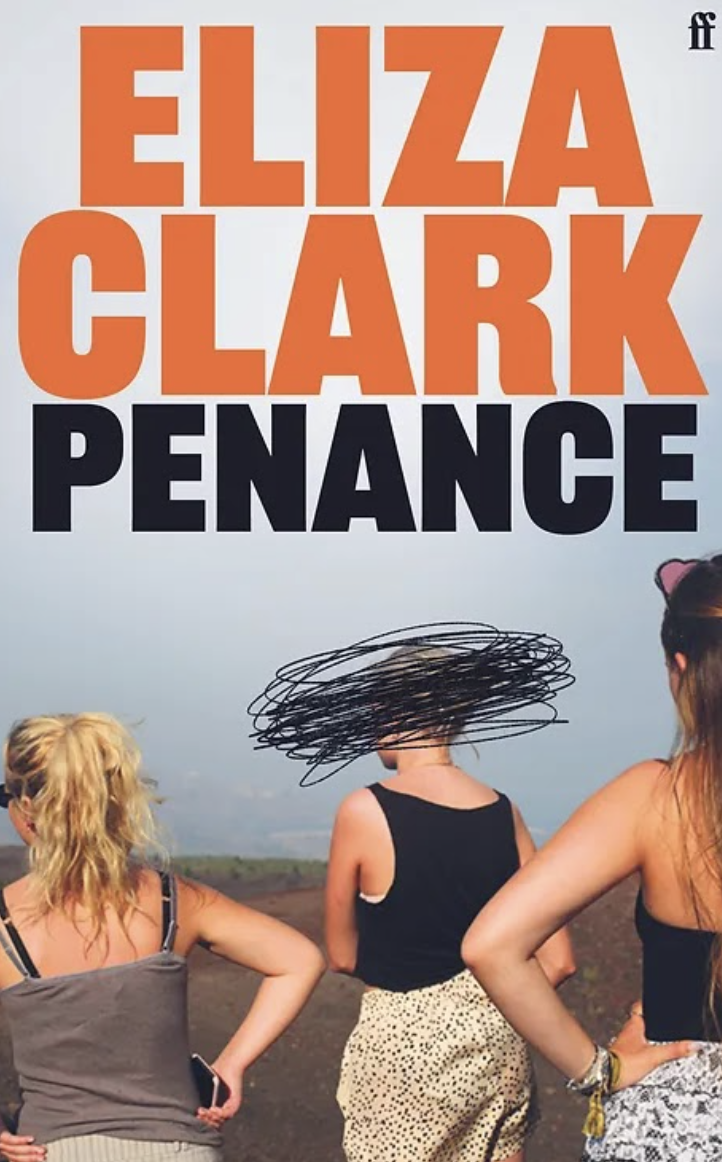[Book Review] Penance (2023) by Eliza Clark
Penance is Eliza Clark’s eagerly awaited second novel following her debut Boy Parts, which found much love and notoriety in online reading circles. Penance is a very different novel and tackles the contemporary true crime obsession and industry through the lens of one fictional murder in a small seaside town in the north of England.
The novel’s status as ‘horror’ is not straightforward. The murder that takes place at the beginning of the novel is obviously horrific, with the scene and bodily horror of it rendered in visceral detail. However, the majority of the rest of the narrative is taken up with unpacking what led to this murder, stories from the victim and perpetrator’s families and friends and a myriad of documents and asides that build up a fuller picture of the town and the crime itself. Penance appears more concerned with what leads to horror and crime and the reactions of the community and wider culture than the horrific act itself.
LISTEN TO OUR HORROR PODCAST!
As well as being horror-adjacent and engaging with the true-crime genre, Penance flirts with other narrative conventions like the coming-of-age or ‘state of the nation’ novel (due to Brexit looming over the event of the murder). However, this doesn’t take away from the examination of true crime culture or telling the story of Crow-on-Sea’s infamous school-girl murder, rather it makes for a rigorous investigation of the entire town’s culture and is fitting for the novel’s mock-non-fiction form.
This form, which sees disgraced journalist Alec Z. Carelli trying to revive his career with a new book about the little-known Crow-on-Sea murder reveals one of the central concerns of the novel, which is the nature of truth in true crime media. Penance illustrates just how much of truth, in true crime and otherwise, is constructed to fit desired narratives and, in the case of true crime, provide satisfying endings where there may be none. Clark explores how there is rarely one truth when dealing with the lives of real people and how interpersonal relationships, prejudices and traumatic events can shape and reshape truth over many years and recountings.
Penance is also perhaps an epistolary novel for the digital age. Rather than the letters and diary entries of classic epistolary form (often utilised in horror classics like Bram Stoker’s Dracula and Mary Shelley’s Frankenstein as well as modern horror classics like Carrie by Stephen King and House of Leaves by Mark Z. Danielewski) Penance utilises online forum chats, Tumblr posts, fanfiction, and the comments left on these in order to create the intensely personal and subjective feeling of the epistolary novel, whilst also maintaining the simultaneous feeling of community and isolation online.
Like Clark’s debut novel Boy Parts, the internet and specifically Tumblr play a large role in Penance. The perpetrators of the murder spend large amounts of time online, often engaging with a true crime school-shooter fandom who call themselves ‘The Creekers’ – a clear reference to the real ‘Columbiner’ fandom named for the 1999 mass shooting at Columbine high school in America. As morbid and disrespectful as it sounds for people to be ‘fans’ of mass shooters or serial killers, Clark shows how people (especially teenagers) can find themselves drawn into such online spaces through cases of teenage loneliness or isolation and deeply misplaced empathy.
True crime lovers might well see themselves in the actions of some of the characters or feel called out by the snippets of fictional podcasts as Clark’s rendition of this media scathingly highlights the questionable morality of consuming the pain, suffering and deaths of others for entertainment and, as is often the case with podcasts, monetary gain through advertising and sponsorships. However, the questionable morality of this media is told with a heavy dose of humour. While many of the topics discussed are serious and disturbing the novel has no shortage of comedy, in fact very few characters or themes escape being skewered by Clark’s irreverent and biting humour. Whether it is the fictional renditions of Tumblr-speak (sure to bring up cringe-worthy memories for anyone deeply online in early 2010s), the cutting interactions of the teenage protagonists, or the inserted true crime media, all is fair game.
Perhaps the only criticism to be levelled at Penance is that it can feel over-long in places. Clark goes into immense detail creating the characters and setting of the novel which is both a strength and a downfall because, as enjoyable as many of the digressions, anecdotes, or historical details are, some readers could find the diversion from the main narrative frustrating or distracting. Ultimately, these departures are in service of crafting a holistic view of a crime, however, and will be immensely rewarding for fans of deeply researched fiction and non-fiction alike.
Overall, Penance is both a triumph of a second novel and exploration of the often slippery and uncomfortable true crime industry.


![[Ghouls Podcast] Maniac (2012) with Zoë Rose Smith and Iona Smith](https://images.squarespace-cdn.com/content/v1/5fe76a518d20536a3fbd7246/1696356006789-NYTG9N3IXCW9ZTIJPLX2/maniac.jpg)
![[Ghouls Podcast] Ghouls Watch: Bucket List of the Dead, Blood Drive, Candy Land & more](https://images.squarespace-cdn.com/content/v1/5fe76a518d20536a3fbd7246/1696261000263-58VQFOVWPE363OFGP7RF/GHOULS+WATCH.jpg)
![[Ghouls Podcast] Tender Is The Flesh with Zoë Rose Smith, Bel Morrigan and Liz Bishop](https://images.squarespace-cdn.com/content/v1/5fe76a518d20536a3fbd7246/1693769261264-MS4TS4Z4QC1N15IXB4FU/Copy+of+%5BJuly%5D+Antiviral%2C+possesoor+and+infinity+pool.jpg)
![[Ghouls Podcast] Antiviral, Possessor & Infinity Pool with Zoë Rose Smith, Amber T and Iona Smith](https://images.squarespace-cdn.com/content/v1/5fe76a518d20536a3fbd7246/1691238787263-XYRKXW2Z7RWI9AY2V2GX/%5BJuly%5D+Antiviral%2C+possesoor+and+infinity+pool+%281%29.jpg)
![[Ghouls Podcast] Ghouls Watch: Body Horror Recommendations](https://images.squarespace-cdn.com/content/v1/5fe76a518d20536a3fbd7246/1691238687847-L9U434I1U4HZ3QMUI3ZP/%5BJuly%5D+Ghouls+Watch+-+Website+%281%29.jpg)
![[Ghouls Podcast] The Last House on the Left (2009) with Zoë Rose Smith and Jerry Sampson](https://images.squarespace-cdn.com/content/v1/5fe76a518d20536a3fbd7246/1687863043713-54DU6B9RC44T2JTAHCBZ/last+house+on+the+left.jpg)
![[Ghouls Podcast] Ghouls Watch: Bones and All, Suitable Flesh, The Human Centipede & more](https://images.squarespace-cdn.com/content/v1/5fe76a518d20536a3fbd7246/1687855203348-7R2KUSNR6TORG2DKR0JF/%5BJune%5D+Ghouls+Watch+-+Website.jpg)
![[Ghouls Podcast] 3 Original vs. Remake Horror Films with Rebecca McCallum & Kim Morrison](https://images.squarespace-cdn.com/content/v1/5fe76a518d20536a3fbd7246/1685286663069-0Q5RTYJRNWJ3XKS8HXLR/%5BJune%5D+Original+vs.+Remake+Horror+Films.png)
![[Ghouls Podcast] Ghouls Watch: The Devil’s Candy, Morgana, Dead Ringers & more](https://images.squarespace-cdn.com/content/v1/5fe76a518d20536a3fbd7246/1685284429090-5XOOBIOI8S4K6LP5U4EM/%5BMay%5D+Ghouls+Watch+-+Website.png)
![[Ghouls Podcast] The Bay (2012) with Ariel Powers-Schaub & Amber T](https://images.squarespace-cdn.com/content/v1/5fe76a518d20536a3fbd7246/1684751617262-6K18IE7AO805SFPV0MFZ/The+Bay+website+image.jpg)

![[Book Review] The Book of Queer Saints Volume II (2023)](https://images.squarespace-cdn.com/content/v1/5fe76a518d20536a3fbd7246/1697187383073-U78VOF5WVDHI9YE8M98A/Screenshot+2023-10-13+at+09.52.31.png)
![[Book Review] Wylding Hall (2015)](https://images.squarespace-cdn.com/content/v1/5fe76a518d20536a3fbd7246/1695484930026-PFRK7O26SLME4JIC49EW/Screenshot+2023-09-23+at+16.59.04.png)
![[Book Review] Penance (2023) by Eliza Clark](https://images.squarespace-cdn.com/content/v1/5fe76a518d20536a3fbd7246/1695481011772-L4DNTNPSHLG2BQ69CZC1/Screenshot+2023-09-23+at+15.54.07.png)
![[Book Review] The Exorcist Legacy: 50 Years of Fear](https://images.squarespace-cdn.com/content/v1/5fe76a518d20536a3fbd7246/1691328003764-IASXC6UJB2B3JCDQUVGP/61q9oHE0ddL._AC_UF1000%2C1000_QL80_.jpg)
![[Book Review] Nineteen Claws And A Black Bird (2020)](https://images.squarespace-cdn.com/content/v1/5fe76a518d20536a3fbd7246/1685872305328-UE9QXAELX0P9YLROCOJU/62919399._UY630_SR1200%2C630_.jpg)
![[Book Review] Manhunt (2022)](https://images.squarespace-cdn.com/content/v1/5fe76a518d20536a3fbd7246/1683911513884-1Q1IGIU9O5X5BTLBXHV9/53329296._UY630_SR1200%2C630_.jpg)













